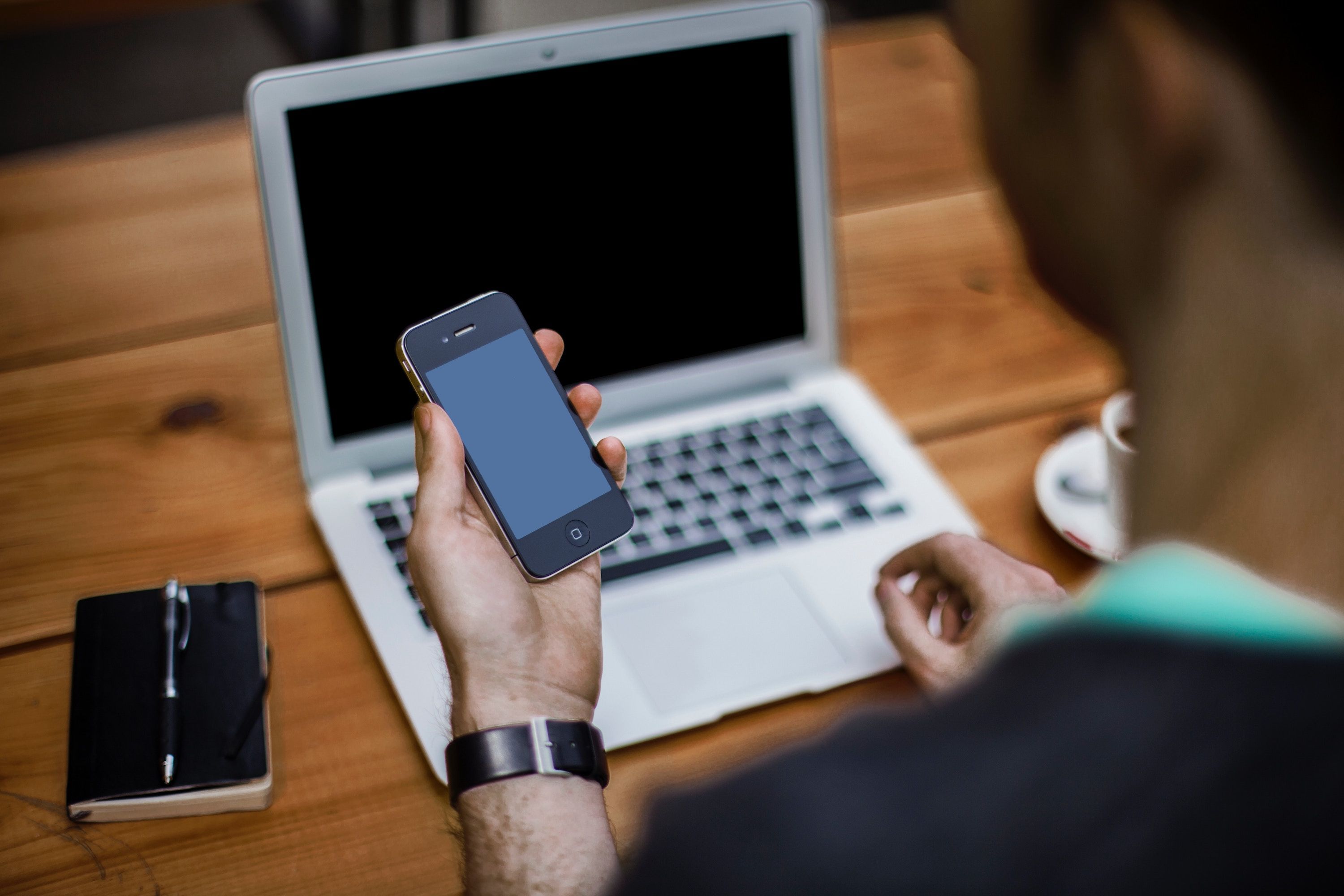Are your daily social media sessions stressing you out? You are not alone. Excessive time spent on social media platforms is linked to increased feelings of anxiety and depression.
You wake up in the morning, roll over, reach for your phone, and a day of scrolling begins. Checking social media accounts like Facebook, Instagram, Twitter, and TikTok dominates an increasing amount of our spare time. We scroll through waiting at stoplights, standing in line, lulls in our workday, and even breaks in conversation with others. For many of us, it’s become so habitual we are not even fully aware we are doing it – or what impact it’s having on our mental health.
Globally, the average internet user spends a whopping two hours and 27 minutes a day checking social media platforms. While some research suggests that the ability to stay connected with family and friends improves mental health outcomes, other studies find that increasing amounts of time perusing social media is linked to anxiety, depression, and a decrease in overall wellbeing.
Examining your relationship with social media is an important step to take towards better mental health. Here are a few suggestions on how to review the role social media plays in your life, and make sure that you are filling your time with healthy offline activities as well.
What Science Says about Social Media and Mental Health
Social media platforms are designed to reinforce use by appealing to the reward centre of the brain. ‘Likes’, ‘follows’, and positive ‘comments’ from others tap into our need for external validation and can make us feel supported and connected. Being entertained or interested in others’ posts also keeps us engaged, to the point where we might spend more time than we planned going down a “rabbit hole” of content. While our increasing hours online are great for advertisers, it is a different story when it comes to our mental health.
From the casual cruelty of internet trolls, to the discomfort of feeling like your life doesn’t measure up with the seemingly perfect lives of others online, to the stress caused by “doomscrolling”, there are downsides that become particularly problematic when these platforms are used in excess. For example, a 2018 study that compared a group of people with unlimited use of social media to a group that was restricted to using it for only 30 minutes per day found that the less people used social media, the less depressed and lonely they felt. Reduced use has also been shown to have positive impacts on anxiety, sleep, and self-esteem.
Do I Have a Social Media Problem?
Social media use has become so ubiquitous it can be difficult to know whether your use is excessive. Aside from trying to figure out how much time you are spending on it, there are some warning signs that can indicate you may actually be forming an addiction to social media.
It’s the first—and last—thing you do every day
Your eyes aren’t even open when you first wake up and reach for your phone – once you’ve got it in hand, you are checking your socials. All day long you are scrolling, including during work, at meal times and even during bathroom breaks. At night, it’s not unusual for you to put off sleep in favor of having a few last looks at your pages. If this sounds like your schedule, you are likely spending too much time on social media.
Your phone gets in the way of your other hobbies
You had so many things planned. You were going to go to the gym, paint your bathroom, take a walk around the park, do a little bit of creative writing – but instead you’ve spent the bulk of your free time on the couch, phone in hand, scrolling the hours away. If you find yourself drawn to your social media above all else, this is a red flag.
Being offline makes you anxious
Your battery died, your connection dropped, you are traveling and you can’t connect to WiFi—whatever the reason, you are suddenly offline and all you can think about is when you can get back on. If you have trouble adjusting to a temporarily phoneless existence, it is important to get into the practice of regularly turning off.
You are totally tuned in to your phone
You can’t stop checking to see how your posts are performing, and have even imagined a few phone buzzes in anticipation. Every place you go you see through the lens of what might be a good post. You spend your time tweaking and editing to make sure what you put up is just right. If the bulk of your thoughts are involved with what’s going online, you need to take a break.
How to Step Back from Social Media
It can be difficult to break the social media habit, especially if you don’t have a concrete plan for cutting down on your usage. Here are a few ways to begin to restructure your social media time.
Tip 1: Resist the Wake-Up Scroll
It sounds so simple, but this can be a serious challenge if you’re stuck on your social media. Wake up, get out of bed and do literally anything else. Whether you go straight into your “getting ready for the day” routine, or you decide to use that time to do some morning exercise, meditate, or stretch, begin your day without your socials. Building in healthy habits like meditation is especially important if you struggle with anxiety or depression, as it helps to quell any stress upon waking and sets the tone for the rest of the day. You may also be surprised at how quickly you get out of the door in the morning when you are not constantly checking your accounts.
Tip 2: Build in Set Time for Social Media
Many people use checking social media as a “filler” activity for any moment when they are not fully occupied by something else. This can end up driving social media usage time up to problematic levels. Try scheduling time during the day that you can devote solely to your social media and stick to it.
30 minutes should be the goal, but if you need to go over that in the beginning that’s okay. The point is to be aware of the time you are spending on your social media, and to start to work in other activities instead of scrolling. This could be picking a book you have been wanting to read, journaling, drawing, working on a new language – anything that you enjoy and can work in easily to your day.
Tip 3: Clean Up Your Accounts
To make sure that when you are spending time on your social media you are not inundating yourself with the negative aspects of it, take a few steps to set some good boundaries and help make your pages a safer space for your mental health. This can include things like:
- Deleting negative messages, spam, or trolling
- Unfollowing accounts that make you feel stressed, upset, or bad about yourself
- Taking down photos from your profile that lower your self-esteem or trigger negative thoughts
- Unsaving any posts that encourage unhealthy comparisons
Tip 4: Talk to a Mental Health Professional
Maybe you have tried taking a step back from your social media use, only to find that you can’t cut back on the time you are spending on it even though you want to. Perhaps you’ve been able to limit your social media usage, but still can’t shake persistent feelings of anxiety and depression. If you are unable to change your social media behaviour, or a change isn’t resulting in an improvement in your mental health, this is a good indication that you should check in with a therapist.
Talking to a professional will help you better understand why you use social media, and explore where your feelings of anxiety or depression are coming from. Together with your therapist, you’ll learn more about yourself, practice different ways to cope with stress, and strengthen your ability to manage difficult feelings when they arise.
Unplugging at The Dawn’s Mental Health Retreat Thailand

The Dawn Wellness Centre and Rehab, located in northern Thailand, is a residential wellness facility that fosters an environment of personal growth and healing for people who want to change their lives and overcome addiction or mental health issues. Internationally accredited by the American Accreditation Commission International (AACI), The Dawn offers personalised treatment plans based on a holistic treatment approach for its clients.
Call us today to learn more about how we can help you discover your potential at The Dawn.
Related Posts
 7 Personality Traits of a Social Media Addict
Facebook and Instagram have recently announced modifications to their apps, in an effort to control social media addiction among their users. The move comes amid growing concern over lost productivity...
7 Personality Traits of a Social Media Addict
Facebook and Instagram have recently announced modifications to their apps, in an effort to control social media addiction among their users. The move comes amid growing concern over lost productivity...
 Eight Tips for Getting the Most Out of Inpatient Mental Health Therapy
You have made an important and potentially life-changing decision to pursue inpatient mental health therapy. Whether you made this choice completely on your own, or have been pressured into it...
Eight Tips for Getting the Most Out of Inpatient Mental Health Therapy
You have made an important and potentially life-changing decision to pursue inpatient mental health therapy. Whether you made this choice completely on your own, or have been pressured into it...
 Eight Tips to Get You Motivated About Addiction Recovery
Finding the motivation to overcome an addiction can feel impossible, even if the idea of recovery has been at the back of your mind for a while. Allowing yourself the...
Eight Tips to Get You Motivated About Addiction Recovery
Finding the motivation to overcome an addiction can feel impossible, even if the idea of recovery has been at the back of your mind for a while. Allowing yourself the...
 Six Tips for Staying Sober over the Holidays
When you are in recovery, the stress and festivities of the holidays can present an additional challenge to staying sober. Remembering that you are not alone – and planning ahead...
Six Tips for Staying Sober over the Holidays
When you are in recovery, the stress and festivities of the holidays can present an additional challenge to staying sober. Remembering that you are not alone – and planning ahead...





